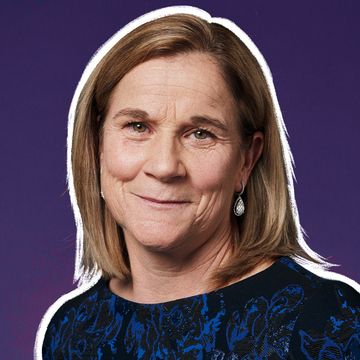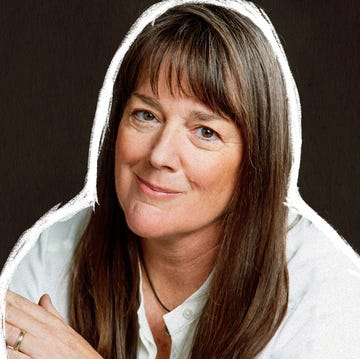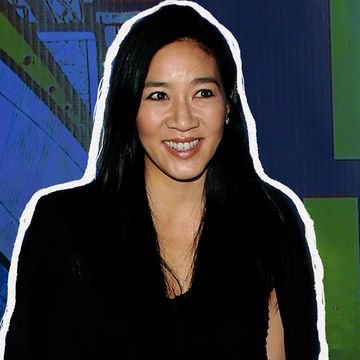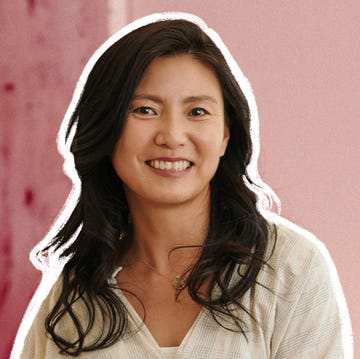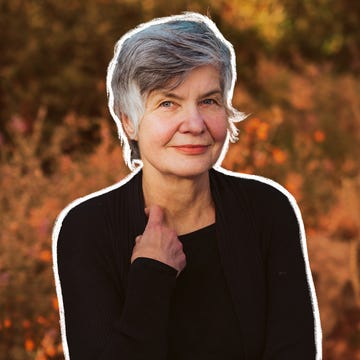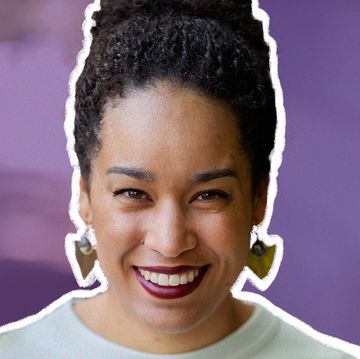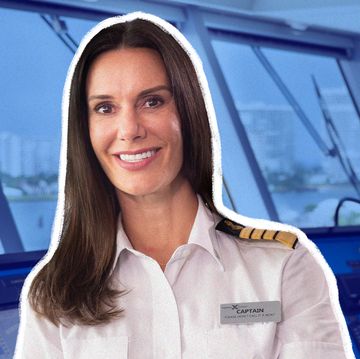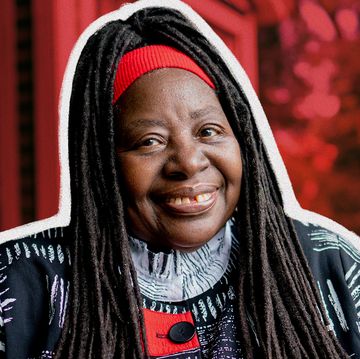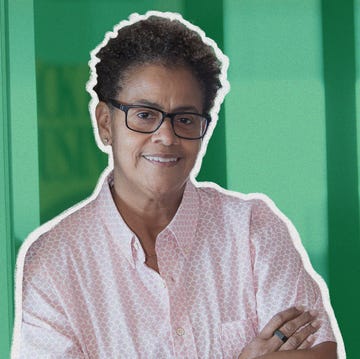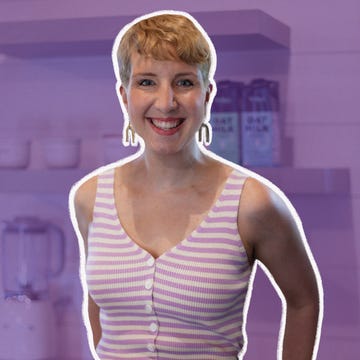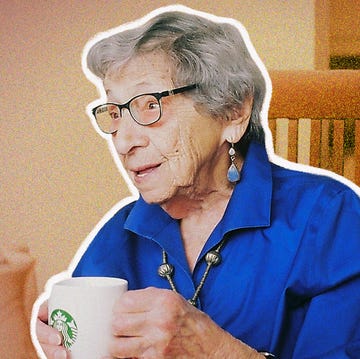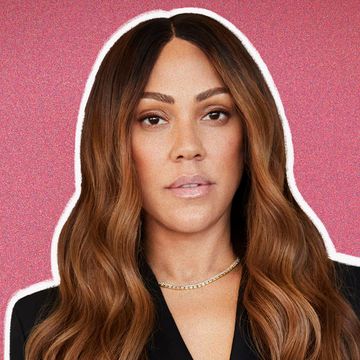In the ongoing Shondaland series Head Turners, we meet interesting women from every facet of life who are crushing it in their careers. From artists and tech mavens to titans of the boardroom, these women are breaking barriers, and they’ll share how you can too.
When Shelley Halstead enrolled at the University of Washington School of Law in 2011, she was 41 years old and her then-15-year career in carpentry and construction had already taken her around the world, from a science station in Antarctica to Mount Hood in Oregon, where she was the only Black queer woman on the forest fire crew.
During law school, Halstead found kinship among advocates for reproductive justice, which defends the human right to physical, mental, and spiritual autonomy. Later, the Iowa native would integrate those principles, along with her carpentry expertise and legal training, into Black Women Build—Baltimore [BWBB], a nonprofit she founded in 2017 to help Black women affirm their independence through acts of radical urban redevelopment.
Because many of the long-abandoned, early-1900s brick row houses of Halstead’s adopted home, West Baltimore, are in need of restoration, BWBB acquires these ruinous sites from the city. Halstead trains Black women to rehab the falling-down domiciles in situ with trade skills like tiling, painting, and installing radiant-heated floors.
The program’s holistic ethos includes financial training to help participants buy into the block. The proof is in the properties: Program graduates have purchased seven of the 10 homes that BWBB has so far fully restored. Eight residences are currently being rehabbed, and 17 more sites have been acquired.
Thanks to Halstead, now 53, homeownership is no longer a fond hope for traditionally marginalized women. It’s an accomplishment. Building community — in this case, architecturally and socially — is a natural outcome of hard work and good intentions. “If you center Black women, lift them up by trying to change the policies and narratives that keep us down,” she says, “you’re going to naturally lift up a lot of other people.”
Shondaland recently spoke with Halstead about how she discovered her truest calling in midlife, where she looks to find unexpected allies, and what Trevor Noah quote continues to inspire her today.
LEILANI MARIE LABONG: What was it like going to law school later in life?
SHELLEY HALSTEAD: Most people were much younger than me. I felt like the professors were my peers. I could be having dinner or going out for a drink with them, rather than getting hammered with the young law students. I had already done that in my life.
LML: Any advice for people who might be thinking about starting a new chapter in mid-career like you?
SH: Take an assessment of what you really want to do in life. For me, I wanted to do something meaningful, to leave my mark. Maybe someone else wants to just make more money? I really don’t know. I would also say that you should find the people who do the same work that you want to do. You have to find your people. You have to get that support.
LML: How did you get involved with reproductive justice?
SH: I did an internship in Oakland with Law Students for Reproductive Justice. The experience affirmed for me all the things that I felt in my being about centering Black women. I’ve also sat on the board of the Seattle Abortion Fund [now called Northwest Abortion Access Fund] and the Baltimore Abortion Fund.
People donating money in order for someone else to access abortion care is the dopest thing ever. I’ve really appreciated being able to find other people that believe in the same things. As a Black queer woman, I have been the counterweight in so many situations. In my first year of law school, when I was the counterweight to all the “bro-secutors” in my class — bros who wanted to be prosecutors. Same thing with the construction trade, where harassment and discrimination can be really difficult.
Black folks, people of color, queer folks, women. We know what we need, and we have what it takes to get whatever that is. It’s those systems of oppression that make us feel like impostors or that we don’t belong. That said, you may find that your allies are not who you would expect them to be. Be open to the situation. Find commonality in people around you. They may not be perfect, but they may be a lifeline.
LML: How did you manage to weave your passions of carpentry, law, and reproductive justice into Black Women Build—Baltimore?
SH: When I was in law school, I was trying to get nonprofits to work with tradeswomen, trying to figure out how to combine RJ and trades, and I couldn’t do it in the legal realm. Nobody cared. So, I had to figure out how to bring these avenues together myself.
Black Women Build—Baltimore was built on an RJ framework: understanding the whole person and the mechanisms that work against our ability to thrive. We understand, for example, how being an AAPI living in Louisiana would be different than living in California. Or how being a Black queer woman in the world is different from being a white straight man in the world.
It’s like what Trevor Noah said on his last night on The Daily Show: “Black women can’t afford to f--k around.” That was so awesome of him to use his last show to lift up Black women. I can’t say it enough: If Black women succeed, then everybody else is most likely succeeding. I have this shirt that says, “No feminism. No future.” But I think, “No Black feminism. No future.”
LML: What do you know now that you wish you knew when you were starting BWBB?
SH: I didn’t know that I was basically starting a company where I would be everything from the custodian to CEO. I have worked more in the last three years than I had in the previous 10 years. I’ve always known that I get a lot of energy out of people not believing in me, but for this endeavor, I was surprised people did not support it because I believed it was such a good idea and so doable. It really bummed me out.
I’ve always known that it’s about who you know over what you know, but somehow I thought this would be different. I would stand up in these community meetings and say, “Hi. My name is Shelley Halstead, and I’m starting this organization. Is there anyone here who can help me save these houses?” My heart would be pounding. And people would just look at me like, “Yeah, whatever; we don’t know who you are.”
It wasn’t until I got a fellowship in 2018 from the Open Society Foundations that people began to take me seriously. The Department of Housing and Community Development finally acquiesced and sold us our first property for $5,000. We paid too much. The roof was falling into the basement.
LML: How can people who want to found a community-focused nonprofit get started?
SH: I would volunteer with the organizations you admire or want to be a part of. Then, I would try to find a job within that realm using the skills that you already have or are willing to learn. That’s what I did. I thought about where I donated money or time. I thought about how I wanted to be useful and what skill set I would need to do that. I participated in things I cared about. And since I was doing something I cared about, I met other similarly minded people who were helpful when I decided to begin my work.
LML: Besides trade skills, financial savvy, and possibly a house, what else have you noticed BWBB participants taking away from the program?
SH: They are now engaging the bureaucracy. They wrote their first grant called Love Your Block. We have seven houses on one block, and soon it will be 10. They want to beautify their block. The women started a once-a-month helper service where you can hire your neighbor to help you with something they’re better at doing than you are. I whisper to people, “Look! They’re building community. They’re actually doing it. It’s working without me.” I didn’t know if it was going to happen, but it’s happening.
Leilani Marie Labong is a San Francisco-based writer who has contributed to Elle Decor, Architectural Digest, Travel + Leisure, San Francisco Chronicle, and Coastal Living. Follow her on Instagram at @leilanimarielabong.
Get Shondaland directly in your inbox: SUBSCRIBE TODAY


